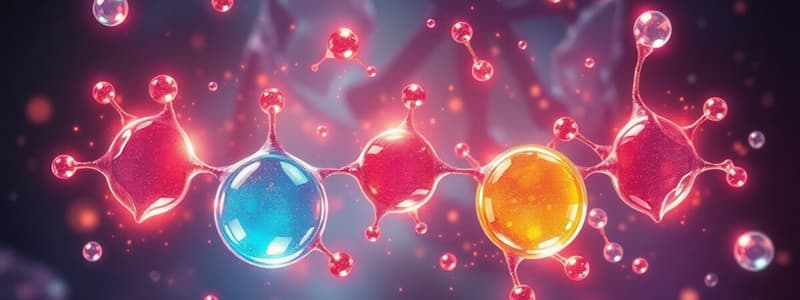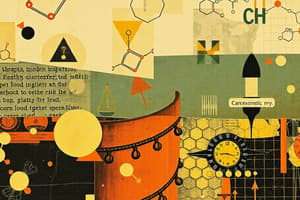Podcast
Questions and Answers
What functional group is characteristic of carboxylic acids?
What functional group is characteristic of carboxylic acids?
- -CHO
- -OH
- -COOH (correct)
- -C=O
What occurs when carboxylic acids react with carbonates?
What occurs when carboxylic acids react with carbonates?
- Formation of esters
- Production of a carboxylate salt, water, and CO2 (correct)
- Release of hydrogen gas
- Formation of alcohols
What is the process called when carboxylic acids react with alcohols to form esters?
What is the process called when carboxylic acids react with alcohols to form esters?
- Fermentation
- Hydrolysis
- Oxidation
- Esterification (correct)
Which of the following describes the solubility of small chain carboxylic acids in water?
Which of the following describes the solubility of small chain carboxylic acids in water?
What type of catalyst is required for the formation of esters from carboxylic acids and alcohols?
What type of catalyst is required for the formation of esters from carboxylic acids and alcohols?
What is a key characteristic of esters in terms of their physical properties?
What is a key characteristic of esters in terms of their physical properties?
What do triglyceride esters result from?
What do triglyceride esters result from?
What is the outcome of ester hydrolysis?
What is the outcome of ester hydrolysis?
What happens to a carboxylic acid when it reacts under acidic conditions?
What happens to a carboxylic acid when it reacts under acidic conditions?
What is saponification?
What is saponification?
Which group is replaced in the formation of carboxylic acid derivatives?
Which group is replaced in the formation of carboxylic acid derivatives?
Which derivative is formed when two carboxylic acids lose water?
Which derivative is formed when two carboxylic acids lose water?
What do acyl chlorides typically release when reacting with water?
What do acyl chlorides typically release when reacting with water?
Which reaction produces aspirin?
Which reaction produces aspirin?
Why is ethanoyl chloride not preferred in industry for producing aspirin?
Why is ethanoyl chloride not preferred in industry for producing aspirin?
In nucleophilic addition-elimination reactions, what forms as a product after a nucleophile adds?
In nucleophilic addition-elimination reactions, what forms as a product after a nucleophile adds?
Flashcards are hidden until you start studying
Study Notes
Carboxylic Acids
- Carboxylic acids contain the functional group -COOH, which includes a carbonyl group (C=O) and an -OH acid group.
- They are produced by oxidizing primary alcohols under reflux.
- Carboxylic acids are weak acids that slightly dissociate in solution, forming a H+ ion and a carboxylate ion, RCOO-.
- They react as acids with carbonates to produce a carboxylate salt, water, and CO2.
- Small chain carboxylic acids can form hydrogen bonds with water molecules due to the lone electron pair on an oxygen atom and a ∂+ hydrogen atom, making them soluble in water.
Esters
- Esters are formed by the reaction of carboxylic acids with alcohols in the presence of a strong acid catalyst.
- This reaction is called esterification and is carried out under reflux.
- Esters are sweet-smelling compounds used in food flavorings and perfumes.
- They have low boiling points and are good solvents for other polar molecules.
Triglyceride Esters
- Vegetable oils and fats are esters of naturally occurring glycerol (propane-1,2,3-triol).
- This alcohol undergoes esterification to form triglyceride esters.
- Biodiesel is an ester produced from vegetable oils and methanol in the presence of a strong acid catalyst.
Hydrolysis
- Ester hydrolysis is the reverse reaction of esterification, converting esters back into alcohols and carboxylic acids.
- It is carried out by adding water under different conditions to produce different products.
- Acidic conditions produce a simple reverse reaction back to an alcohol and a carboxylic acid.
- Alkaline conditions result in the carboxylic acid reacting with the base to form a salt, a process called saponification.
- These salts are commonly used as soaps due to their hydrophilic and hydrophobic properties.
Acylation
- Carboxylic acids have derivative molecules where the -OH group is replaced by another group.
- The three main derivatives are:
- Acid Anhydrides: Formed by removing water from two carboxylic acids.
- Acyl Chlorides: React violently due to the very polar -COCl group.
- Amides: React to form N-substituted amides.
Reactions of Derivatives
- These compounds react via nucleophilic addition-elimination reactions.
- In these reactions, the addition of a nucleophile leads to the elimination of a product under aqueous conditions.
- Acyl chlorides can react with other compounds:
- Water: Produces carboxylic acid.
- Alcohol: Produces ester.
- Ammonia: Produces amide.
- Amines: Produces N-substituted amide.
Aspirin
- Aspirin is an ester produced from salicylic acid and ethanoic anhydride.
- Ethanoyl chloride can also be used to produce aspirin but is not used industrially due to its expense and production of harmful HCl fumes.
- Ethanoic anhydride is much safer for industrial use.
Studying That Suits You
Use AI to generate personalized quizzes and flashcards to suit your learning preferences.




